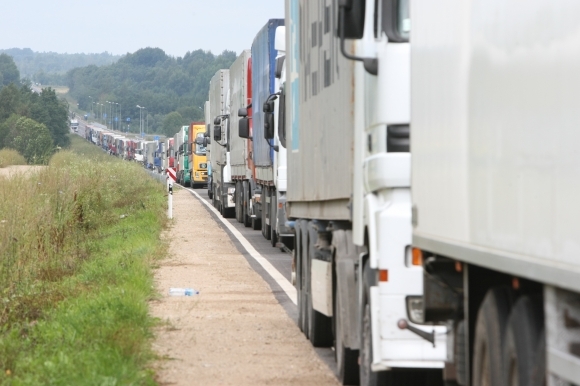
Russia’s Trade Warfare Against Lithuania Is a Challenge to the European Union
Publication: Eurasia Daily Monitor Volume: 10 Issue: 182
By:

Effective from October 7, Russia has banned the imports of Lithuanian dairy products. The Consumer Protection and Sanitary Inspectorate (Rospotrebnadzor) chief, Gennady Onishchenko, announced the ban, and now threatens to step up testing of Lithuanian meat and fish products at the border. Moscow has not provided any evidence to substantiate its ostensible concerns about food safety. These measures come on top of Russian customs authorities’ systematic harassment of Lithuanian trucking companies carrying various types of goods into Russia (see EDM, October 10).
Russia resorts to trade warfare-type measures against neighboring countries (members as well as non-members of the European Union) periodically and selectively. But Moscow’s current actions are its most extensive and brazen ever. It is now targeting the European Union’s incumbent presiding country, Lithuania. It no longer bothers to answer Lithuanian and EU inquiries about the basis for complaints. On other fronts, Russia is currently imposing (and threatening to impose more) arbitrary restrictions on trade with the EU’s Eastern Partnership countries—Ukraine, Moldova and Georgia.
These countries are set to conclude association, free-trade, and travel visa liberalization agreements with the EU at the Eastern Partnership’s summit on November 28–29 in Lithuania. The Kremlin seeks to derail that process by demonstrating its capacity to damage the economies of countries that choose association with the EU, rather than joining Russia’s Customs Union and Eurasian Union projects. Moscow also clearly seeks to punish Lithuania, the most proactive country in implementing the EU’s energy market legislation at home and promoting the EU’s Eastern Partnership goals. In every sense, Russia’s economic measures against Lithuania amount to measures against the European Union.
Acting as it regularly does as a political instrument of Russia’s government, Rospotrebnadzor claims to have found substances dangerous to health in milk, cheese and other Lithuanian-made dairy products. Rospotrebnadzor’s Onishchenko had issued as usual several warnings before announcing the dairy ban on very short notice. But these statements have only been made for the mass media’s consumption, in a polemical mode (Interfax, September 16, October 2, 7).
Reflecting the political resentment behind these trade restrictions, Onishchenko characterized Lithuania as a “microscopic new political formation,” guilty of “noisy vulgar statements about Russia” (Rossiyskaya Gazeta, October 4). Onishchenko had in recent years characterized Moldova and Georgia as “dwarf states” or “midgets”; but he is now attacking the EU’s incumbent presidency in such terms, on the Russian government’s behalf.
The Kremlin seems to underestimate the readiness of European institutions in Brussels to rally behind Lithuania. The EU’s Directorate-General for Health and Consumer Policy (a part of the European Commission) expresses its confidence that Lithuanian food products are safe and of good quality, corresponding with the EU’s stringent food safety criteria. According to the directorate-general’s spokesman, no EU country has complained about Lithuanian-made food products, while Russia has not provided any evidence for its own complaints.
The EU’s Trade Commissioner Karel de Gucht, Health and Consumer Policy Commissioner Tonio Borg, and Tax and Customs Commissioner Algirdas Semeta have each written to Russian authorities requesting explanations for the measures against Lithuania. No explanations have been provided thus far. A continuing refusal could itself provide the basis for referring the matter to the World Trade Organization (WTO) (EurActiv, BNS, October 9, 10; Kommersant, October 10).
On the political level, the EU’s High Representative for Foreign Affairs and Security Policy, Catherine Ashton, remonstrated with Russian Foreign Affairs Minister Sergei Lavrov about “discriminatory measures” against Lithuania during their recent meeting in New York. The European Parliament has adopted a resolution encouraging the European Commission to support Lithuania, one possible step being a complaint within the WTO regarding Russia’s trade-restricting practices (BNS, October 9).
The impact on Lithuania (losses already inflicted and potential losses) may be roughly estimated from fragmentary data available at this point. While Lithuanian foodstuffs hold only small niches of Russia’s vast market, Lithuania’s food-processing sector forms an important part of the country’s competitive economy, and supports a significant political constituency. Exports to Russia account for a major share of Lithuania’s revenue in the food-processing sector. Eighty-five percent of Lithuanian dairy exports go to Russia. Dairy exports to Russia have been growing year-on-year, reflecting the products’ good reputation. The value of dairy exports to Russia rose to €155 million ($210 million) in 2012 (up by 12 percent from 2011), and reached €106 million ($144 million) for the first seven months of the current year, on track toward hitting almost €200 million ($271 million) in 2013, until Russia imposed the ban (BNS, October 7; Vedomosti, Kommersant, October 10).
Additionally, Lithuania exports meat and meat products to Russia to the tune of $65 million per year. Furthermore, 70 percent of Lithuania’s fish exports have Russia as their destination. Meat and fish exports are now also under threat (see above). On October 7, Rospotrebnadzor instructed Russia’s customs offices to step up the inspection of Lithuanian meat and fish products. According to the letter of instructions, those Lithuanian products are dangerous to health and fall short of Russia’s quality standards. Rospotrebnadzor representatives are to be posted at customs checkpoints, both at the border and inside Russian territory (RIA Novosti, Interfax, October 7). Given the small size of Lithuania’s economy, Russian import restrictions as announced can hit this country painfully.
The European Union clearly sees the political motives through Moscow’s ostensible safety and sanitary concerns. The EU is acting accordingly in support of Lithuania. In Washington, the Barack Obama administration campaigned for Russia’s admission to the WTO despite Russia’s track record of imposing trade restrictions on its neighbors for political reasons. Faced with this latest case of rogue behavior, the United States may be asked to join the EU at the political level in raising this matter with Russia.




